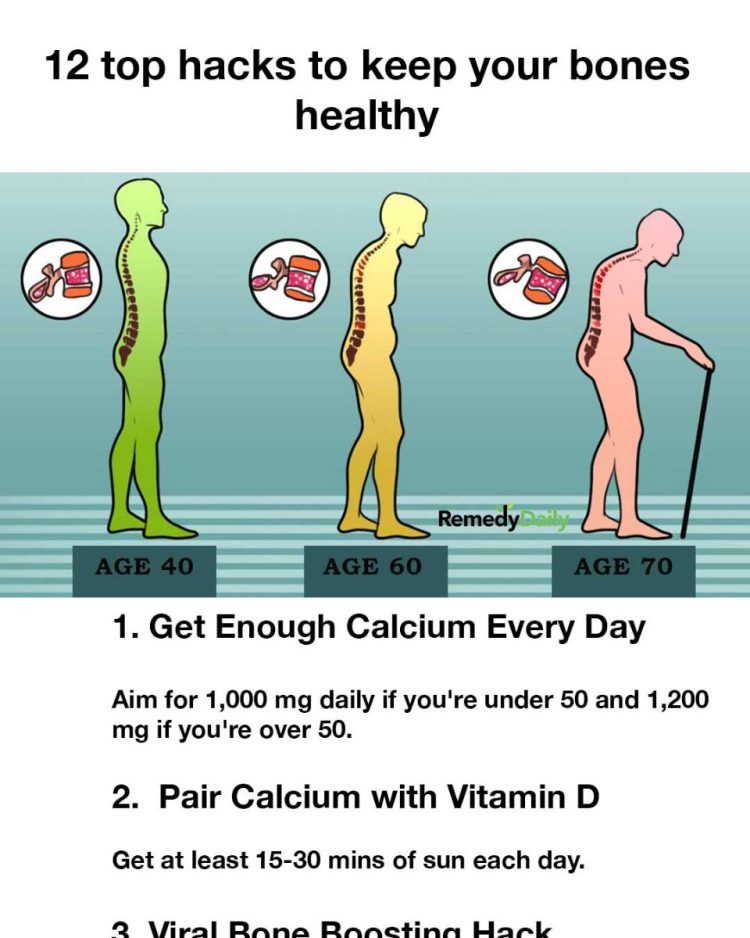As we age, our bones naturally lose density, making us more susceptible to fractures, osteoporosis, and joint pain. But the good news is that you can take proactive steps to keep your bones strong and resilient, no matter your age. Whether you’re in your 40s and looking to prevent future problems or in your 70s and aiming to maintain mobility, small lifestyle changes can have a big impact on bone health. From diet and exercise to smart habits that reduce bone loss, the right approach can help you stay active, independent, and pain-free for years to come.
In this guide, we’ll explore 12 science-backed hacks to keep your bones in top shape. These simple but powerful strategies—like increasing calcium and Vitamin D intake, engaging in weight-bearing exercises, and prioritizing balance training—are designed specifically for those in their 40s to 80s. By making a few adjustments to your daily routine, you can build stronger bones, reduce your risk of fractures, and improve your overall quality of life. Let’s dive in and future-proof your bones!
1. Get Enough Calcium Every Day
Why it Works: Calcium is the building block of bones. If your body doesn’t get enough from your diet, it pulls calcium from your bones, weakening them.
How to Do It:
Aim for 1,000 mg daily if you’re under 50 and 1,200 mg if you’re over 50.
Best sources: Dairy products, leafy greens, almonds, and fortified foods (like plant-based milk).
If needed, consider calcium supplements, but don’t overdo it—too much can lead to kidney stones.
2. Pair Calcium with Vitamin D
Why it Works: Your body needs Vitamin D to absorb calcium properly. Without it, even a calcium-rich diet won’t help your bones.
How to Do It:
Get 15-30 minutes of sunlight daily.
Eat Vitamin D-rich foods: Fatty fish (salmon, mackerel), eggs, and fortified dairy products.
If needed, take a Vitamin D3 supplement (ask your doctor about dosage).
Viral Bone-Boosting Hack: The “Prune Challenge” – Eat 5-6 Prunes a Day!
Why It Works: Prunes (dried plums) aren’t just for digestion—they’re bone superfoods! Research shows that eating 5-6 prunes daily can help slow bone loss, improve bone density, and reduce fracture risk. Prunes are packed with potassium, vitamin K, and antioxidants, all of which support bone health by reducing inflammation and preventing calcium loss.
How to Do It:
Eat 5-6 prunes a day as a snack, mix them into yogurt, or blend them into a smoothie.
If you want an extra boost, aim for 10-12 prunes per day (but increase gradually to avoid digestive discomfort).
Try this for at least 6 months—studies show real improvements in bone density over time!
✅ Bonus: Prunes also support gut health, reduce inflammation, and may help prevent osteoporosis naturally.
3. Strength Training Exercises
Why it Works: Strength training puts stress on bones, which stimulates them to grow stronger. It also improves balance, reducing the risk of falls.
How to Do It:
Lift weights, use resistance bands, or do bodyweight exercises like squats and lunges.
Try strength training at least 2-3 times per week.
4. Do Weight-Bearing Activities
Why it Works: Bones respond to impact by increasing density. Activities like walking and dancing help maintain bone strength.
How to Do It:
Walk, jog, climb stairs, or play tennis for at least 30 minutes most days.
Swimming and cycling are great for fitness, but they don’t improve bone density as much—balance them with weight-bearing exercises.
5. Eat More Magnesium and Vitamin K
Why it Works: These nutrients help with calcium absorption and bone mineralization.
How to Do It:

12 top hacks to keep your bones healthy
ADVERTISEMENT
For Complete Cooking STEPS Please Head On Over To Next Page Or Open button (>) and don’t forget to SHARE with your Facebook friends
ADVERTISEMENT